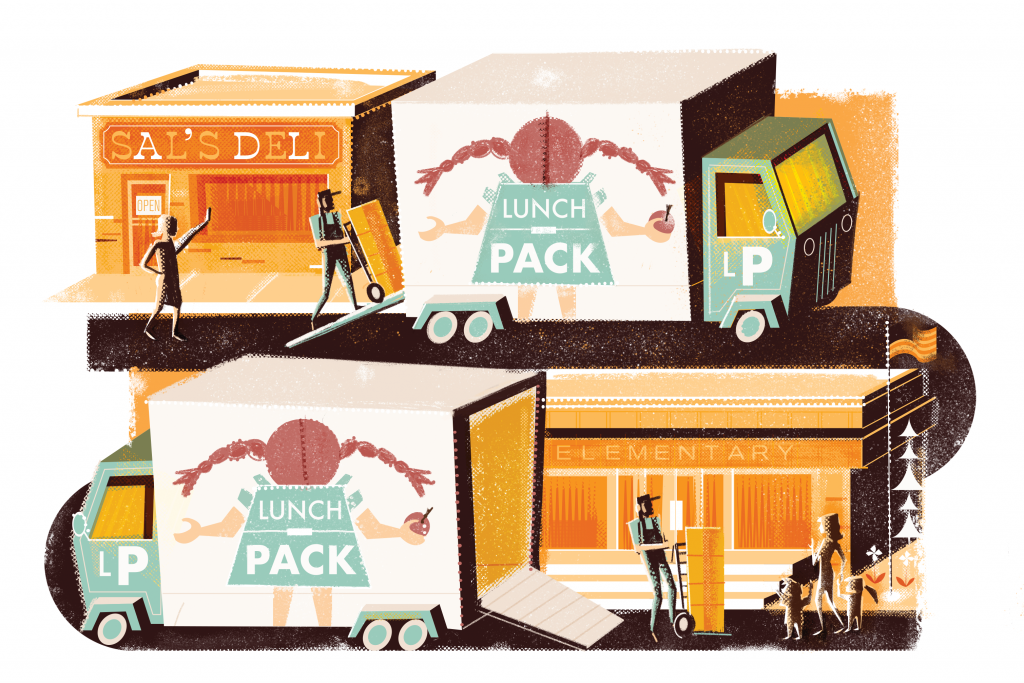Illustration by Scotty Reifsnyder
Food banks are humanitarian missions that are ultimately judged by how well they provide for those in need. They are responsible for receiving food and distributing it to the communities they are serving, which makes them vital links in the supply chain.
Misty Blessley, associate professor of supply chain and operations management, and Susan Mudambi, professor of marketing, conducted in-depth interviews with supply chain members, such as farmers, processing firms and food banks in their research, A Trade war and a pandemic: Disruption and resilience in the food bank supply chain, which was funded by a Center for International Business Education and Research (CIBER) grant. The project came about because Blessley and Mudambi had overlapping interests in food banks and public and agricultural policies.
The U.S-China trade war caused food supply chain disruptions, and the COVID-19 pandemic compounded the problems. This inspired Blessley and Mudambi to research food banks through the lens of supply chain turbulence.
“Trade war is a term that is used to describe a dispute over allowing imports or exports to flow freely across country borders,” says Mudambi. U.S farmers have generally been in favor of the free market because they want the borders to be open in order to export their products.”
Disputes over new tariffs and trade restrictions during the Trump administration escalated into a trade war when China announced it would stop buying U.S. agricultural commodities. Since China is the largest U.S. export market for many farm products, this left U.S. farmers already with perishable products that they couldn’t sell. Some of that food was purchased by the U.S. Government and provided to food banks, even though the food banks may not have wanted, needed or had experience with the specific commodities.
Mudambi and Blessley looked at how food banks coped, and how they built resilience during these uncertain and turbulent circumstances.
“Food banks play a vital role in the supply chain, but they only have so much space to store their supplies. Unlike traditional grocery stores, food banks don’t all have warehouse space or infrastructure,” says Blessley. Food banks are required to hold different foods at specific temperatures and frequently do not know until arrival if a perishable food such as dairy products will be refrigerated or frozen. “Some food banks reported pressures to take food because they hold the responsibility to serve the community but didn’t necessarily have all the storage options that for-profit companies have.”
Supply chain disruption is a reoccurring issue, but the pandemic exposed many of the cracks that exist in the food bank supply chain.
“One never knows when the next disruption will happen that will affect us globally,” says Blessley. “Food banks do not only receive food, but they also receive some funding for infrastructure, while needing to stick within a certain budget. They rely heavily on collaborating with distribution partners, and this was particularly true in the early days of the COVID pandemic when food demand was high, volunteer availability fluctuated, and distribution models required social distancing and touchless delivery.”
When it comes to teaching about this topic in the classroom, Blessley emphasizes that food banks are beneficiaries of our government policy to protect farmers.
“This topic can be discussed in various ways, as it has to do with sustainability, marketing, international business and human resources,” says Mudambi. “A key finding for me was seeing how this related to management information systems (MIS), because having a functioning online portal is important so that people can figure out where the food banks are, what products are available and how much stock they have.”
Supply chain disruption is something that will never go away and is often very difficult to predict. However, understanding supply-chain resilience is critical for food banks to receive appropriate amounts of products that can be properly stored and served to the community. Being able to anticipate, adapt and respond to supply chain turbulence is an essential part of being a successful organization or business.
Food insecurity is an ongoing concern across the country and in the city of Philadelphia. Both Blessley and Mudambi stress the importance of not only donating food, but also the benefits of monetary contributions. Food banks can purchase the food needed at lower costs than individual consumers can, and that cuts out the need to handle large quantities of perishable and bulky food products.
Check out phila.gov for more information on food distribution sites in the Philadelphia region.

